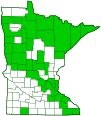horned spanworm moth
(Nematocampa resistaria)
Conservation • Description • Habitat • Ecology • Distribution • Taxonomy
|
||||||||
| Hodges # | 7010 |
|||||||
Conservation Status |
||||||||
| IUCN Red List | not listed |
|||||||
| NatureServe | NNR - Unranked SNR - Unranked |
|||||||
| Minnesota | not listed |
|||||||
Description |
||
Horned spanworm moth is a small geometer moth. It occurs across the United States and southern Canada. In the U.S. it is common east of the Great Plains and in the northwest but is rare or absent elsewhere. Adults are found from early June to late September in deciduous and mixed forests and woodlands, in meadows, and in parks. Mature caterpillars are found in late spring. They feed on more than 60 species of plants from at least 20 families, including deciduous and coniferous trees, shrubs, and herbaceous plants. Adults have a ¾″ to 1″ (19 to 25 mm) wingspan. Females are larger than males. The female has a ½″ to 9⁄16″ (12 to 14 mm) forewing length. The outer margin of both wings is always angled, the forewing especially so. The ground color is almost always whitish or cream-colored, rarely yellowish, and the markings are reddish-brown. The antemedial (AM) line is a single line that is mostly straight but curved sharply forward approaching the leading edge (costal margin). The postmedial (PM) line is represented by two lines (doubled). The inner line is slightly wavy and sharply bent forward approaching the costal margin. The outer line is bolder, wavier, and straight to the costal margin. The two lines converge twice, almost touching, before spreading far apart at the costal margin. The subterminal (ST) area, beyond the PM line, is darker purplish-brown on the inner half, pale on the outer half. All of the pale areas on the forewing are lightly shaded with numerous short, fine, horizontal lines. The veins are also dark. The hindwing is similar, but the entire ST area is dark. The male has a ⅜″ to 9⁄16″ (10 to 14 mm) forewing length. The wing shape, ground color, and markings are all variable. The forewing is usually rounded, sometimes angled. The ground color is usually yellowish, sometimes whitish. There is often a dark blotch in the ST area covering part of the darkened inner half and extending into the outer pale half. The caterpillar is up to ¾″ (2 cm) long and is instantly recognizable. The ground color varies from yellow to brown and is overlain by dark, medium, and light brown mottling. On each of the first and second abdominal segments there is a pair of curled, extendable, white-tipped tentacles (filaments). |
||
Size |
||
Wingspan: ¾″ to 1″ (19 to 25 mm) |
||
Similar Species |
||
Habitat |
||
Deciduous and mixed forests and woodlands, meadows, and parks. |
||
Ecology |
||
Season |
||
One generation per year: early June to late September |
||
Behavior |
||
The caterpillar often rests on an upper leaf surface with the body looped. It has been suggested that this mimics a fallen flower and its stamens. When alarmed, it inflates the filaments to twice their length. The adult sometimes rests on the upper side of a leaf, where it resembles a dead leaf; on the underside of a leaf, where it resembles a dead patch; or on leaf litter on the ground, where it blends in with the background. |
||
Life Cycle |
||
|
||
Larva Hosts |
||
Plants from at least 20 families, including deciduous and coniferous trees, shrubs, and herbaceous plants. |
||
Adult Food |
||
|
||
Distribution |
||||
|
Sources |
|||
| 10/14/2022 | ||||
Occurrence |
||||
Common |
||||
Taxonomy |
|||
Order |
Lepidoptera (Butterflies and Moths) | ||
Superfamily |
Geometroidea (Geometrid and Swallowtail Moths) | ||
Family |
Geometridae (Geometer Moths) | ||
Subfamily |
Ennominae (Typical Geometers) | ||
Tribe |
Ourapterygini | ||
Genus |
Nematocampa | ||
This species was formerly classified as Nematocampa limbata. In 1993 the North American species was separated from the Eurasian species and given the new species epithet. |
|||
Synonyms |
|||
Ania limbaria chagnoni Eugonobapta brunneolineata Microgonia vestitaria Nematocampa expunctaria Nematocampa filamentaria Nematocampa limbata Nematocampa orfordensis Phalaena limbata |
|||
Common Names |
|||
bordered thorn filament bearer horned spanworm moth |
|||
Glossary
Antemedial (AM) line
A thin line separating the basal area and the median area of the forewing of Lepidoptera.
Costal margin
The leading edge of the forewing of insects.
Postmedial (PM) line
A thin line separating the median area and the postmedial area of the forewing of Lepidoptera.
Visitor Photos |
|||||
Share your photo of this insect. |
|||||
| This button not working for you? Simply email us at info@MinnesotaSeasons.com. Attach one or more photos and, if you like, a caption. |
|||||
Babette Kis |
|||||
Nematocampa resistaria (horned spanworm moth) Nematocampa resistaria, horned spanworm moth, photographed at the hedgerow adjacent to Barnes Prairie, Racine Co. WI on July 5, 2022. I often find these moths on the underside of leaves. In this picture the moth is on the underside of a Solomon's seal leaf. |
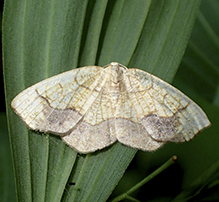 |
||||
Alfredo Colon |
|||||
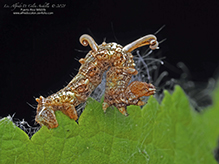 |
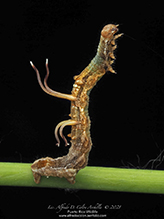 |
||||
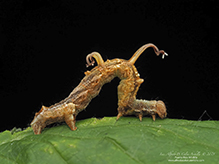 |
|||||
MinnesotaSeasons.com Photos |
|||||
|
|||||

Visitor Videos |
|||
Share your video of this insect. |
|||
| This button not working for you? Simply email us at info@MinnesotaSeasons.com. Attach a video, a YouTube link, or a cloud storage link. |
|||
Other Videos |
|||
| Horned Spanworm Moth (Geometridae: Nematocampa resistaria) on Wall Carl Barrentine |
|||
About
Aug 6, 2011 Photographed at Red Wing, Minnesota (04 August 2011). Thank you to Maury Heiman (@Bugguide.net) for confirming the identity of this specimen! |
|||
| filament bearer aka horned spanworm Nematocampa resistaria Al Can |
|||
About
Jun 5, 2020 I was at the park and noticed something hanging down like spiders do from a tree it looked like a caterpillar but had silk like i was wondering what type of creature this is ? |
|||
| Horned Spanworm Moth Caterpillar (Nematocampa resistaria) HipHopHead80 |
|||
About
Jul 24, 2015 https://en.wikipedia.org/wiki/Nematocampa_resistaria (I think?) |
|||

Visitor Sightings |
|||||
Report a sighting of this insect. |
|||||
| This button not working for you? Simply email us at info@MinnesotaSeasons.com. Be sure to include a location. |
|||||
| Babette Kis 7/5/2022 |
Location: Barnes Prairie, Racine Co., WI Nematocampa resistaria, horned spanworm moth, photographed at the hedgerow adjacent to Barnes Prairie, Racine Co. WI on July 5, 2022. I often find these moths on the underside of leaves. In this picture the moth is on the underside of a Solomon's seal leaf. |
||||
| Alfredo Colon 6/4/2021 |
Location: Woodbury, MN |
||||
| Alfredo Colon 6/2/5/30 to 6/1/2021 |
Location: Woodbury, MN |
||||
MinnesotaSeasons.com Sightings |
|||||
|
|||||

Created: 10/14/2022
Last Updated:
